We have a question for you. How much vitamin A did you consume yesterday?
No idea? We thought so.
On the flip side, you’d probably spill out the exact number if we had asked about your daily protein intake.
Before you feel guilty about this, know that most people are just like you. Most lifters understand the importance of macronutrients — protein, carbs, and fats — and go to great lengths to abide by a balanced macro-focused diet. It’s common for people to spend hours researching the right macronutrient split for their muscle-building goals. Only a handful, however, sit down with micronutrients. Vitamins are the missing piece in most unsuccessful transformation programs.
Micronutrients, especially vitamins, can help support muscle growth and take you toward your physique goals. Vitamins and minerals support cellular synthesis and tissue repair, which can help build bigger and stronger muscles.
Although almost all foods and beverages contain vitamins, meeting your daily vitamin needs from your diet is tough. Vitamin deficiencies can hinder your muscle growth and recovery.
If you have been following a balanced diet, training, and recovery program but still cannot achieve the desired results, it’s time you look into your micronutrient intake. This article covers the basics of vitamins, their types, their benefits, and the six vitamins that should be a part of your fitness regimen.
What are Vitamins?
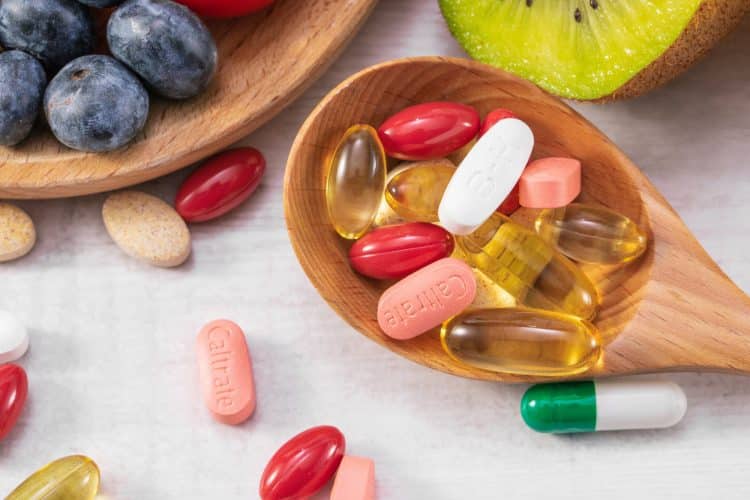
Vitamins are organic compounds that we need in small quantities for proper functioning. We need to get most of our vitamins from our diet as our body doesn’t produce them or produces them in minuscule amounts. Prolonged vitamin deficiencies can increase the odds of developing specific health issues.
Notably, vitamins don’t include the three other essential nutrient groups — essential fatty acids, minerals, and essential amino acids.
[sc name=”style-summary2″ ]
Trivia: All vitamins were discovered between 1913 and 1948. Commercially produced vitamin B complex and semi-synthetic vitamin C became available in 1935. Before 1935, folks had to live with vitamin deficiency diseases if they lacked a particular vitamin in their diet.
[/sc]
Types of Vitamins
There are 13 types of vitamins, which can be put into two categories:
Fat-Soluble Vitamins
The body stores these vitamins in fatty tissue and the liver. Fat-soluble vitamins can stay in the body for days and sometimes months. Dietary fats aid in absorbing fat-soluble vitamins through the intestinal tract. Vitamins A, D, E, and K are the most popular fat-soluble vitamins. [1]
Water-Soluble Vitamins
The body cannot store water-soluble vitamins. Plus, they do not stay in the body for long after consumption. People need a higher supply of water-soluble vitamins than fat-soluble vitamins. Vitamin C and B vitamins are water-soluble. [2]
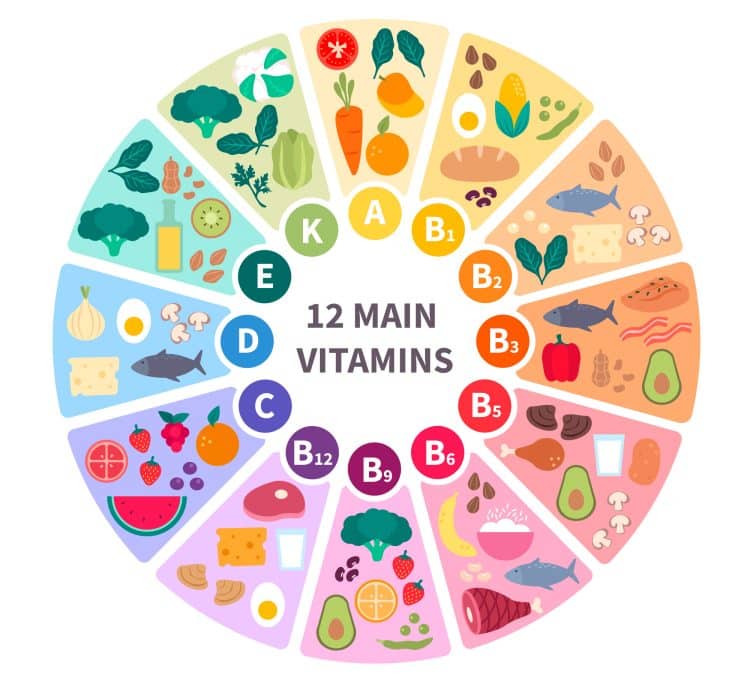
Below are the 13 vitamins:
- Vitamin A
- Vitamin B1
- Vitamin B2
- Vitamin B3
- Vitamin B5
- Vitamin B6
- Vitamin B7
- Vitamin B9
- Vitamin B12
- Vitamin C
- Vitamin D
- Vitamin E
- Vitamin K
6 Best Vitamins For Building Muscle and Strength
Put your gains on the fast track by adding these vitamins to your daily regimen:
1. Vitamin C (Ascorbic Acid)
Ascorbic acid, also known as vitamin C, is arguably the most popular vitamin. Many have grown up chewing tangy vitamin C tablets.
Collagen is a protein found in cartilage, tendons, bones, connective tissue, and skin. Meeting your ascorbic acid goals can help prevent injuries. A study of 13,000 subjects found that individuals with the highest vitamin C also had greater lean muscle mass. [3]
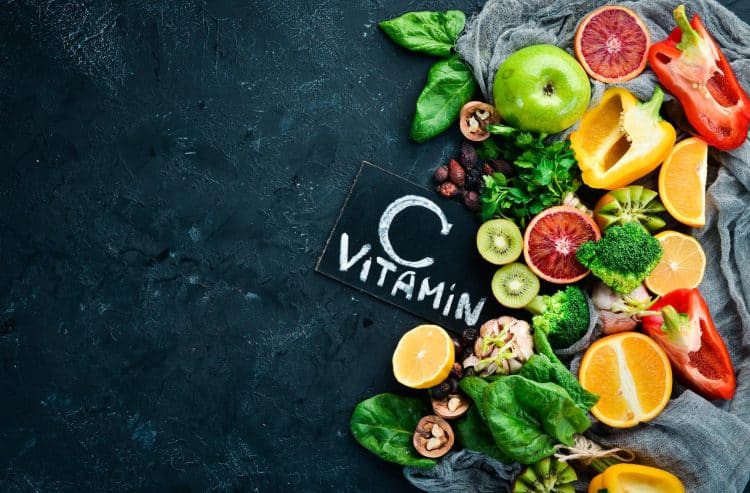
Vitamin C deficiency can lead to scurvy. It causes poor tissue growth and wound healing, bleeding gums, and a loss of teeth.
Infants who only consume evaporated or boiled milk, folks who smoke or have exposure to secondhand smoke, people with certain health conditions, especially those that involve intestinal malabsorption, and those who do not consume a varied diet are at an increased risk of vitamin C deficiency.
2,222mg per day is the maximum recommended vitamin C intake for adults. On the flip side, if a person consumes more than 1,000mg of vitamin C in a day, it might not be fully absorbed and can lead to diarrhea and gastrointestinal discomfort. You should consume around 200mg of vitamin C daily to optime your gains.
The best sources of Vitamin C include:
- Spinach and other green, leafy vegetables
- Tomatoes
- Potatoes
- Green peas
- Strawberries
- Red and green peppers
- Oranges and orange juice
- Grapefruit
- Kiwifruit
Check Out: 10 Best Vitamin C Supplements
2. Vitamin B
Vitamin B complex consists of eight water-soluble vitamins. This is the most crucial vitamin type for muscle growth. Here is a brief overview of each with their functions and deficiency risks:
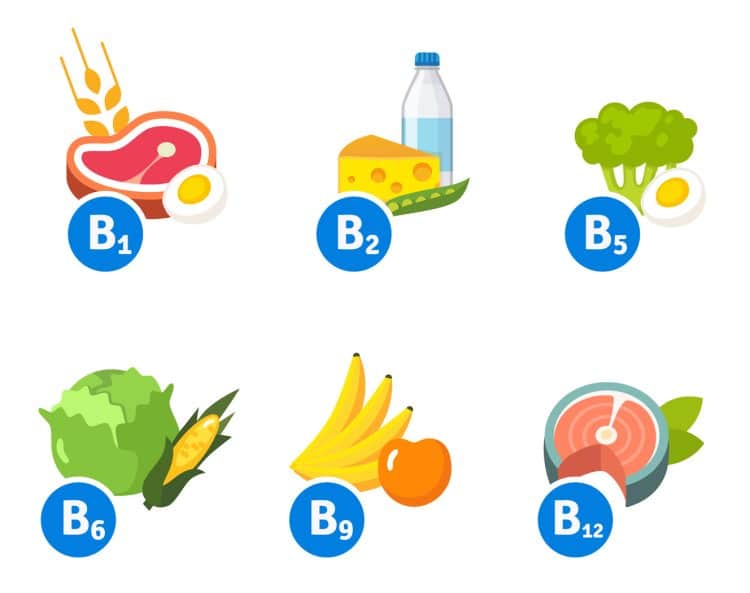
Vitamin B1 (Thiamine) — RDA: 1.2mg
Thiamine helps produce various enzymes that aid in breaking down blood sugar. Vitamin B1 deficiency can cause beriberi and Wernicke-Korsakoff syndrome.
Vitamin B2 (Riboflavin) — RDA: 1.3mg
Riboflavin helps metabolize fat and protein and helps convert carbs to ATP for energy.
It also aids in the growth and development of body cells. According to a study, vitamin B2 can reduce soreness and muscle pain during and after prolonged exercise and might enhance early recovery post-workout [4]. Vitamin B2 deficiency can result in inflammation of the lips and fissures in the mouth.
Vitamin B3 (Niacin, Niacinamide) — RDA: 16mg
Niacin promotes cell growth and optimal functionality. Vitamin B3 can improve vascularity, which can add to your aesthetics. Furthermore, niacin can improve muscle performance, repair, recovery, and improved metabolism. Low niacinamide levels can result in pellagra, which causes skin changes, diarrhea, and intestinal upset.
Vitamin B5 (Pantothenic Acid) — RDA: 5mg
Pantothenic acid is essential for producing energy and hormones. Vitamin B5 insufficiency causes paresthesia, commonly known as the pins and needles sensation.
Vitamin B6 (Pyridoxine, Pyridoxamine, Pyridoxal) — RDA: 1.3mg
It helps in red blood cell formation. Vitamin B6 is essential for the metabolism of the increased protein intake in a muscle-building program. It also promotes nitric oxide production, boosting endurance, stamina, and muscle pumps. Low vitamin B6 levels can cause anemia and peripheral neuropathy.
Vitamin B7 (Biotin) — RDA: 30mcg
Biotin is known for boosting skin, hair, and nail health. It also helps the body metabolize proteins, fats, and carbohydrates. Biotin deficiency can cause intestine inflammation and dermatitis.
Vitamin B9 (Folic Acid, Folinic Acid) — RDA: 400mcg
Folic acid is essential for constructing DNA and RNA. Vitamin B9 deficiency during pregnancy can hamper the fetus’s nervous system.
Vitamin B12 (Cyanocobalamin, Hydroxocobalamin, Methylcobalamin) — RDA: 2.4mcg
Vitamin B12 is crucial for a healthy nervous system. It maintains myelin, which ensures your muscles contract at the right time. Like vitamin B6, your body needs B12 to make red blood cells. It can help you feel strong and energized throughout the day [5]. Its shortage can cause some types of anemia and neurological problems.
B6, B12, and folate are the most important B vitamins for building muscle and improving cell function. Since the B complex is a set of eight vitamins, you must consume various foods to meet your daily needs.
Here are some of the top picks:
- Fruits, such as citrus, banana, and watermelon
- Soy products
- Blackstrap molasses
- Wheat germ
- Yeast and nutritional yeast
- Milk
- Cheese
- Eggs
- Liver and kidney
- Meat, such as chicken and red meat
- Vegetables, such as beets, avocados, and potatoes
- Whole grains and cereals
3. Vitamin A (Retinol, Retinal)
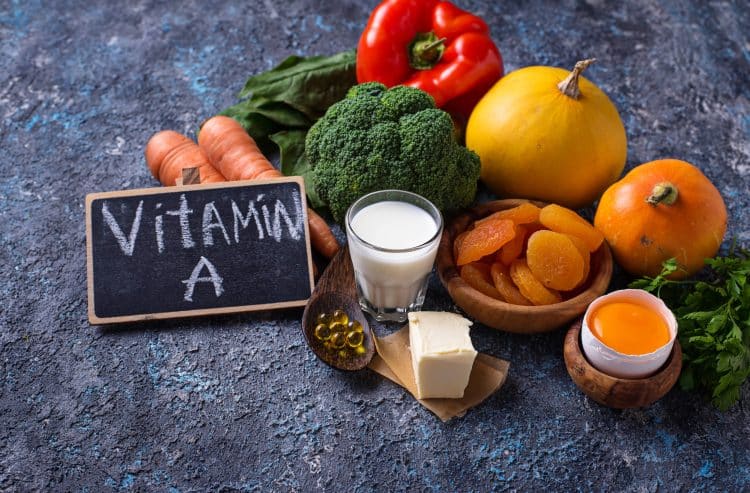
Vitamin A is one of the most undermined vitamins. It is a fat-soluble vitamin that is essential for optimal eye health. Retinol and retinoids are gaining popularity for their anti-aging and acne-treating properties.
Plus, vitamin A can promote protein synthesis, leading to muscle growth. Conversely, enhanced protein synthesis results in lower vitamin A levels. Vitamin A helps break down protein during the muscle repair process. It can promote muscle structural strength by boosting bone development.
Vitamin A shortfall can cause night blindness and keratomalacia. It can also lead to a fall in testosterone production in males of all ages. 900mcg is the recommended vitamin A intake for adults.
Foods rich in vitamin A include:
- Milk and cheese
- Organ meats
- Fatty fish, such as tuna and herring
- Eggs
- Cantaloupe
- Apricot
- Mango
- Squash
- Sweet potato
- Red peppers
- Pumpkin
- Carrots
- Broccoli
- Spinach
4. Vitamin D (Ergocalciferol, Cholecalciferol)
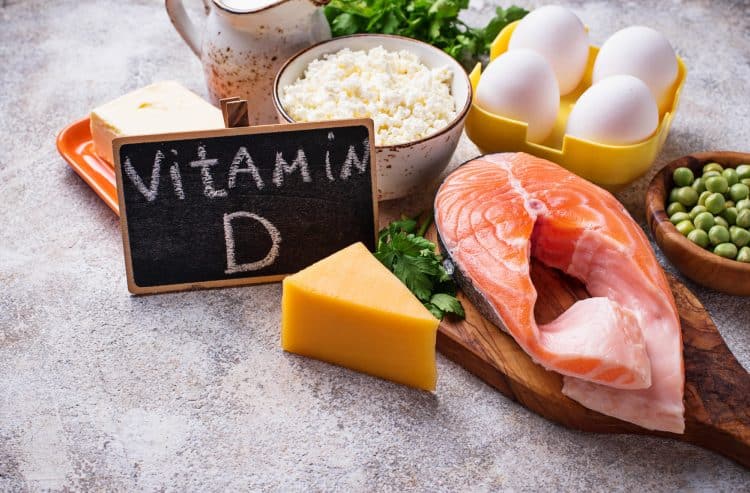
Vitamin D is one of the most important vitamins for building muscle. The sunshine vitamin is crucial for bone strength and may support the immune system and other functions. Our bodies produce vitamin D in response to direct sun exposure.
The fat-soluble vitamin can boost testosterone production, which can rev up protein synthesis. It can also improve explosive power in adults. [6]
Vitamin D shortage can cause rickets, osteomalacia (softening of the bones), and muscle cramps. 600IU (15mcg) is the RDA for vitamin D. Spending 30-60 minutes outdoors can help you achieve this goal.
Best sources of vitamin D:
- Exposure to UVB rays from the sun
- Fatty fish
- Eggs
- Beef liver
- Mushrooms
5. Vitamin E (Tocopherol, Tocotrienol)
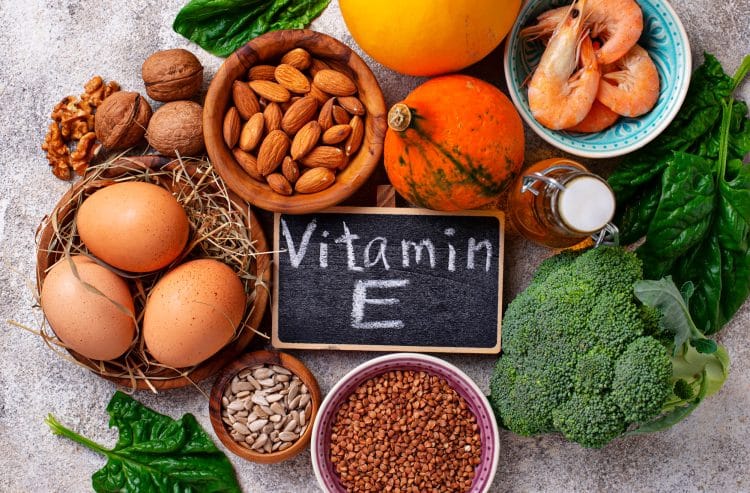
Vitamin E is a fat-soluble vitamin popular for its skin benefits, especially its role in reducing stretch marks. It is an antioxidant that helps prevent oxidative stress, which can cause muscle atrophy, increase inflammation, and risk various diseases. Vitamin E also helps flush out free radicals from your body, reducing muscle damage after strenuous activities.
A vitamin E deficiency can hamper physical performance, muscle growth, recovery, and immune health. Vitamin E can boost blood flow, which can speed up your muscle growth and recovery by supplying nutrient-rich blood throughout your body.
Best sources of vitamin E:
- Wheat germ oil
- Sunflower, safflower, and soybean oil
- Sunflower seeds
- Almonds
- Peanuts, peanut butter
- Beet greens, collard greens, spinach
- Pumpkin
- Red bell pepper
6. Vitamin K2
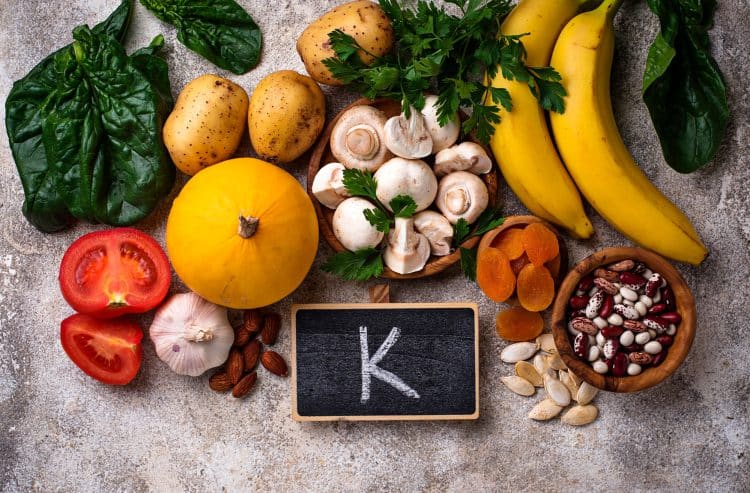
Compared to B complex and vitamin D, vitamin K2 is relatively undiscovered. It is present in certain animals and fermented foods, which most people don’t eat enough.
Vitamin K2 is a fat-soluble vitamin that can help improve bone and dental health. Experts recommend combining vitamin D and K2. Vitamin D helps absorb calcium, which vitamin K then uses to build bones. Without vitamin K, calcium might clog your arteries instead of building stronger bones.
You can divide vitamin K2 into several different subtypes. MK-4 and MK-7, however, are the most important ones. MK-4 is derived from animal sources like dairy products, and MK-7 is from bacterial fermentation.
Best sources of vitamin K2:
- Kale
- Collard greens
- Butter
- Sauerkraut
- Beef liver
- Legumes
- Cheese
- Egg yolks
- Chicken
Check Out: 10 Best Vitamin K2 Supplements
Best Multivitamin
Learning about all these vitamins might be overwhelming. After all, all this knowledge is worthwhile only if you can put it to use. Consuming 13 different supplements or keeping a tab of every micronutrient in the foods you eat is nearly impossible. You could, however, use a multivitamin supplement to ensure you meet all your micronutrient needs.
We recommend the Evlution Nutrition VITAMODE as it is a full spectrum product, meaning it supplies all necessary vitamins, minerals, enzymes, antioxidants, plus micro and phytonutrients for promoting optimal health.
This multivitamin supp supplies at least 100 percent RDA of vitamins and minerals plus 100mg of fruits and veggies. Remember, you shouldn’t worry about overshooting your vitamin and mineral RDA. Your body will flush the excess through urine.
Evlution Nutrition VITAMODE

Evlution Nutrition VITAMODE
Evlution Nutrition VITAMODE uses a high-performance formula with over 50 active ingredients, including a wide range of superfood extracts and potent energy vitamins. This supp helps enhance bone strength, energy, immunity, eye care, skin health, and muscle.
Related: 7 Best Men’s Multivitamins
Wrapping Up
Vitamins are an often-overlooked aspect of strength training and recovery. They can help build bigger and stronger muscles directly and indirectly through various functions. This article lists the role of vitamins and why they should be a part of your fitness regimen.
Although you should push to meet your daily macro and micronutrient needs through nutrient-dense whole foods, it could be difficult for folks with packed schedules. We recommend the Evlution Nutrition VITAMODE if you want a supplement to settle all your vitamin and mineral goals.
References
- Reddy P, Jialal I. Biochemistry, Fat Soluble Vitamins. [Updated 2022 Sep 19]. In: StatPearls [Internet]. Treasure Island (FL): StatPearls Publishing; 2022 Jan.
- Lykstad J, Sharma S. Biochemistry, Water Soluble Vitamins. [Updated 2022 Mar 9]. In: StatPearls [Internet]. Treasure Island (FL): StatPearls Publishing; 2022 Jan.
- The University of East Anglia. “How vitamin C could help over 50s retain muscle mass.” ScienceDaily. ScienceDaily, 27 August 2020.
- Hoffman MD, Valentino TR, Stuempfle KJ, Hassid BV. A Placebo-Controlled Trial of Riboflavin for Enhancement of Ultramarathon Recovery. Sports Med Open. 2017 Dec;3(1):14. doi: 10.1186/s40798-017-0081-4. Epub 2017 Mar 28. PMID: 28349501; PMCID: PMC5368102.
- Ankar A, Kumar A. Vitamin B12 Deficiency. [Updated 2022 Oct 22]. In: StatPearls [Internet]. Treasure Island (FL): StatPearls Publishing; 2022 Jan.
- Chen C, Zhai H, Cheng J, Weng P, Chen Y, Li Q, Wang C, Xia F, Wang N, Lu Y. Causal Link Between Vitamin D and Total Testosterone in Men: A Mendelian Randomization Analysis. J Clin Endocrinol Metab. 2019 Aug 1;104(8):3148-3156. doi: 10.1210/jc.2018-01874. PMID: 30896763.


